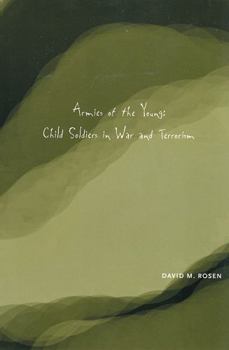Armies of the Young: Child Soldiers in War and Terrorism
Select Format
Select Condition 
Book Overview
Children have served as soldiers throughout history. They fought in the American Revolution, the Civil War, and in both world wars. They served as uniformed soldiers, camouflaged insurgents, and even suicide bombers. Indeed, the first U.S. soldier to be killed by hostile fire in the Afghanistan war was shot in ambush by a fourteen-year-old boy.
Format:Paperback
Language:English
ISBN:0813535689
ISBN13:9780813535685
Release Date:January 2005
Publisher:Rutgers University Press
Length:216 Pages
Weight:0.80 lbs.
Dimensions:0.6" x 6.0" x 8.9"
Customer Reviews
3 ratings
Enlightening and controversial resource,
Published by Thriftbooks.com User , 16 years ago
Armies of the Young is an excellent resource for researchers on the subject of the hows and whys of child soldiers. Pair this book with Healing The Children of War (Phyllis Kilbourn), you will have two great books dealing with the issue of child soldiers. Rosen's book gives little hope as to how to help rehabilitate former child soldiers, and rightly so, it is not the focus of his writing. This is where Kilbourn's book can be of help.
Child Soldiering complexified
Published by Thriftbooks.com User , 17 years ago
To date, most of the writing about child soldiers comes from the discipline of psychology or from the world of human rights. The psychology writing tends to assume that children involved in war will be traumatized and the rights literature tends to see soldiering as one of the worst abuses of children. Without downplaying the indisputable horrors of some individual's experiences, David Rosen, a professor of anthropology and law at Fairleigh Dickinson University, asks us to understand child soldiering from a political perspective. He brings clear thinking to the field by daring to question the assumptions of the human rights regime. In so doing, he comes down firmly on the side of a growing number of scholars of childhood who insist on foregrounding child agency rather than always seeing them as hapless victims. Of course, there is a delicate line here. One does not want to run the risk of downplaying the violence children experience, but this is a necessary corrective to child protection discourses that almost completely remove any sense of agency in childhood. How do we return to a focus on agency? Rosen makes clear that "Ethnography - particularly the methods of participant observation--has unsettled conventional concepts of childhood and remains the best way to study children. Observing and listening to the voice of the child in natural settings, where children are not disempowered by the regimes of formal interviewing, testing, and measurement, provide the clearest portraits of the competence of children" (133). There are a lot of assumptions circulating in the world about what causes child soldiering, and very little hard evidence to back up those assumptions. One of the most often repeated is the notion that the worldwide traffic in small arms is responsible for the rise in child soldiers. The argument is that smaller guns mean that smaller people can now wield them. To me the most useful achievement of this book is the effective skewering of the small arms argument. The author also does an excellent job of situating humanitarian discourse on child soldiers within debates about "new wars" and about the vulnerability of children. The core of the book is made up of three chapters on different historical and geographical examples of conflict and different models of youth participation in political violence. He looks at young Jewish partisans from World War II, the child soldiers of the recent civil war in Sierra Leone, and young Palestinians of the Intifada. The use of examples from the past is useful because the arguments become easier to follow when somewhat removed in time from the presently regnant child rights regime. He calls all of the young people in his case studies "child soldiers," in order to demonstrate that using today's lenses retrospectively forces us to look at the past differently, but also obliges us to acknowledge the constructed nature of the lenses. As a specialist on child soldiers of Sierra Leone, I n
Challenges the Paradigms of Children and War
Published by Thriftbooks.com User , 18 years ago
In this meticulously documented book, Rosen takes on the controversy over child soldiers on four sites -- the World War II partisans, the civil war in Sierre Leone, the Palestinian intifada, and the United Naitons agencies and affiliated non-governmental organizations that draft treaties. He exposes the myths that child soldiers are either wild demons or exploited angels, revealing children as surprisingly independent decison-makers, sophisticated thinkers, and rational, responsible yet eternally subordinate social actors, constrained by contexts of violence. Rosen, who is both an anthropologist and an attorney, has drawn on his own fieldwork and cultural and legal understandings, to create a book that is deceptively readable but so deeply analytical that you will never see the connection between children and war in the same way again. Evryone who has a child, or has been a child, or cares about our planetary future, should read it.






